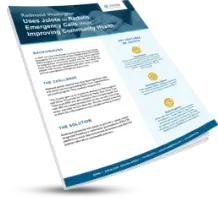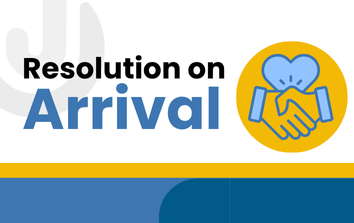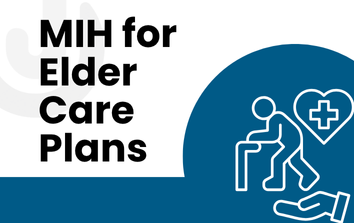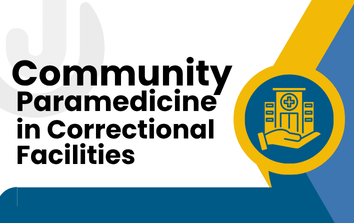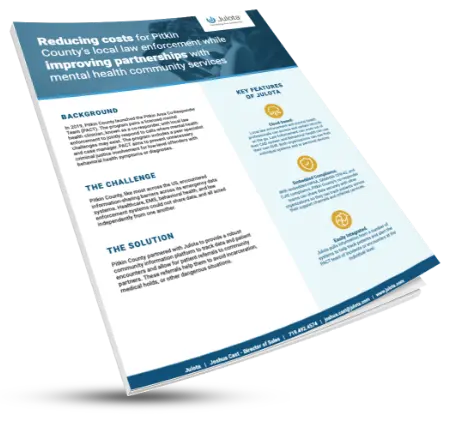The Importance of Training in Crisis Intervention
Certain situations, such as dealing with an armed hostage situation or a mental health crisis, are more likely to involve one or multiple sources of the above stress. In recent years, law enforcement programs have focused on how they can best respond to individuals suffering from a mental health crisis to provide the best treatment for that individual while also ensuring officer safety and reducing officer stress.
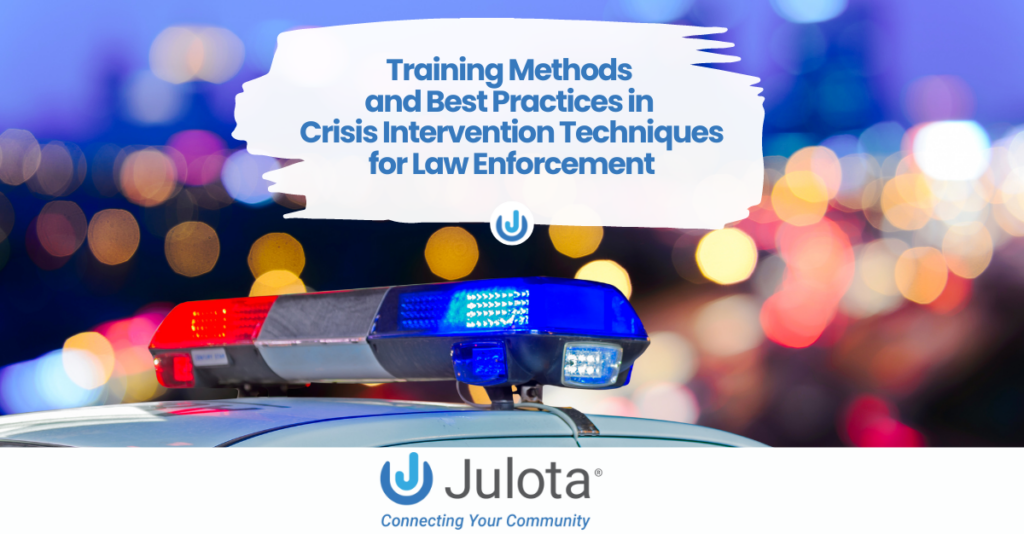
Types of Crisis Intervention Mental Health Situations
Stressful and Traumatic Events
Law enforcement officers often encounter high-stress situations that can be both physically and emotionally demanding. These may include active shooter scenarios, domestic violence calls, or severe accidents. According to the National Institute of Justice, approximately 15% of officers experience post-traumatic stress symptoms following critical incidents.
Mental Health Emergencies
Mental health-related calls have become increasingly common for law enforcement. A study by the Treatment Advocacy Center found that individuals with untreated mental illness are 16 times more likely to be killed during a police encounter compared to other civilians. This underscores the critical need for specialized training in handling mental health crises.
Crisis Intervention Training Programs
Implementing the best practices in crisis intervention has demonstrated its effectiveness as a stress management procedure for law enforcement departments frequently encountering high-stress situations. Coined in 1988 in Memphis, the term ‘Crisis Intervention Team’ has gained significant recognition, and the CIT model has been widely embraced nationwide.
Because of the lack of crisis intervention mental health services across the United States, law enforcement officers are often the first and only responders to most crises. A Crisis Intervention Team (CIT) is a community-based program that builds connections between law enforcement, mental health providers, hospital emergency services, and individuals with mental illness and their families. This collaborative approach, which values the input and involvement of all stakeholders, is the key to the success of a CIT program.
Critical Components of Crisis Intervention
Immediate Response
The first few minutes of a crisis situation are crucial. Officers trained in crisis intervention techniques are equipped to quickly assess the situation, establish rapport, and begin de-escalation procedures. This immediate response can significantly reduce the risk of harm to the individual in crisis and the responding officers.
Short-Term Support
Crisis intervention also involves providing short-term emotional and practical support to individuals experiencing acute distress. This may include connecting them with mental health resources, family members, or community support services.
Safety Assessment
A critical component of crisis intervention is conducting a thorough safety assessment. This involves evaluating the immediate environment for potential hazards, assessing the individual’s risk of self-harm or harm to others, and implementing necessary safety measures.
6 Steps for Proper Crisis Intervention Mental Health Implementation
Implementing the best practices for crisis intervention involves a structured process. The first step is to establish a network of relationships within the community. This network should encompass representatives from all agencies with which individuals with mental health concerns are likely to interact, including law enforcement, mental health providers, emergency housing assistance, and substance abuse programs.
The second step requires these organizations’ leaders to commit to solving community crisis issues. Third, you need a comprehensive understanding of your existing community-wide response to mental health crises. This involves identifying all available resources and resource gaps.
The fourth step requires overhauling the crisis response infrastructure. This includes increased data collection, staffing, and new policies and procedures.
The fifth step is the most widely known resource: the CIT training program for law enforcement professionals and 911 dispatchers. This is most often an intensive five-day training. This training aims to increase officers’ awareness of mental health issues and knowledge of available community resources. This training program is available for purchase online and can be customized to your local needs.
One of the most impactful portions of this training program has been consistently reported as the Sharing Your Story with Law Enforcement (SYSLE) presentation program. This is a portion of CIT officer training where individuals and families struggling with mental illness present stories of lived experiences to law enforcement officers. These stories provide officers an opportunity to hear the experiences of individuals who experienced being in crisis and may have interacted with law enforcement as a result but are now living well with mental illness. These stories help increase understanding and empathy, which, in turn, dramatically improves crisis response.
The final step in a successful CIT program is to honor a commitment to ongoing improvement among your community partners. The data collected from the first few years of a CIT program will supply much information on how communities meet individual needs. A successful CIT program requires leaders who will review this data to ensure that new improvements are continuously being made to serve its vulnerable populations best.
Having the best practices in crisis intervention in place has shown both financial and community-building benefits. Financial benefits result from officers reducing the amount of time spent on mental health calls and diverting individuals from local jails to mental health treatment programs. Community-building benefits result from law enforcement officers having improved knowledge and attitudes.
Crisis Intervention Techniques
Active Listening
Active listening is a fundamental skill in crisis intervention. It involves fully concentrating on what the person in crisis is saying, understanding their message, and responding thoughtfully. This technique helps build trust and can significantly de-escalate tense situations.
De-escalation Strategies
De-escalation techniques are crucial in managing crises. These may include using a calm tone of voice, maintaining a non-threatening body posture, and employing verbal techniques to reduce tension. Research has shown that proper de-escalation training can reduce use-of-force incidents by up to 50%.
Risk Assessment
Conducting a thorough risk assessment is vital in crisis intervention. This involves evaluating the individual’s mental state, potential for violence, and immediate needs. Accurate risk assessment helps officers determine the most appropriate course of action, whether providing on-site support or facilitating transportation to a mental health facility.
Co-Responder Programs
Another approach for responding to individuals experiencing a mental health crisis is a Co-Responder Program. Co-responder programs function by pairing a law enforcement officer with a mental health professional and having this pair respond to mental health crises together. In many communities, EMS and fire are part of the co-responder equation.
There is a great deal of variety in how Co-Responder programs have been implemented due to differing funding and staffing constraints. For example, some communities have these co-responding units act as primary or secondary response teams. Additionally, in some communities, these units respond across the jurisdiction, and in others, their efforts are focused on specific high-need areas. Some communities have co-responder units available at all times, while other jurisdictions may only offer these services for a set number of hours per day.
No matter how a community implements the specifics of its Co-Responder Program, the goal remains the same: to enhance civilian and officer safety during interactions, develop partnerships with the mental health system to facilitate diversion and connect people experiencing behavioral health crises to resources and services.
Co-responder programs have only been utilized since the late 1990s but have already shown great benefits. The two most significant benefits that have been reported are the reduced strain on the criminal justice system, resulting from fewer mentally ill individuals being detained at local jails and officers spending less time on mental health-related calls, and better ties to community services, with increased collaboration between law enforcement and mental health care providers.
One example of a successful Co-Responder Program is AllHealth Network in Arapahoe County, Colorado. AllHealth’s team consists of 10 licensed clinicians who are co-responders. Each team member has practiced for at least two years and receives extensive on-the-job training.
AllHealth has had a massively beneficial impact on its local community. Reductions have been found in the decreased amount of individuals suffering from mental health crises booked in Arapahoe County Jail. The law enforcement training has been the most significant factor in these reduced booking numbers. “It teaches them how to respond to individuals who are experiencing a behavioral health crisis so that they’re more prepared in the situation,” she asserted. “It also teaches them a lot about de-escalation … and how to interact with a person who might be having a mental health or substance use crisis,” said Cynthia Grant, PhD, MBA, LCSW, chief clinical officer.
Other benefits of the installation of AllHealth’s Co-Responder Program are:
- Approximately 40% of calls result in a crisis intervention strategy that does not require transportation to an emergency department or jail
- Secondary response follow-ups result in nearly 70% of the clients being connected to mental health services
- The estimated cost reduction per year per co-responder is $350,000 (based on an average of 60 in-person contacts per month).
The Six-Step Crisis Intervention Mental Health Model
Defining the Problem
The first step in crisis intervention is identifying the core issue or problem that has led to the crisis. This involves gathering information from the individual, witnesses, and any available reports to understand the situation.
Ensuring Safety
Safety is paramount in any crisis situation. This step involves assessing and mitigating immediate risks to the individual in crisis, bystanders, and responding officers.
Providing Support
Offering emotional support and reassurance is crucial in crisis intervention. This can help calm the individual and create a more conducive environment for problem-solving.
Exploring Alternatives
Once the immediate crisis is stabilized, the focus shifts to exploring potential solutions or alternatives. This may involve discussing treatment options, connecting with support services, or developing coping strategies.
Making Plans
Based on the alternatives explored, a concrete plan of action is developed. This plan should be realistic, achievable, and tailored to the individual’s needs and circumstances.
Obtaining Commitment
The final step involves securing the individual’s commitment to follow through with the agreed-upon plan. This may include scheduling follow-up appointments, arranging for ongoing support, or setting specific goals for the near future.
Benefits of Crisis Intervention Response
One of the most significant concerns in a crisis response program is the collaboration and communication between law enforcement and mental health professionals.
There are several ways to facilitate this communication, but choosing a cloud-based, data-driven program offers significant benefits. Many existing crisis programs need help to close gaps and meet individual needs in a follow-up after a crisis is experienced. Reliable and secure data sharing is the easiest way to solve these issues.
A data-sharing platform allows law enforcement and mental health professionals to connect on their devices in real time, allowing them to access data or update records in the field.
Data-sharing platforms, such as Julota, can also help eliminate concerns about data privacy and compliance with federal and state privacy laws.
Reliable data collection when adding the best practices for crisis intervention or co-responder programs may help secure additional grant funding and report to lawmakers and policymakers. Often, communities know their program is making a difference but need more data to support this claim. Julota allows you to custom-create the data collection field to best help your community.
One of the other benefits of a cloud-based program is that different agencies, apart from law enforcement and emergency mental health providers, can be involved in data sharing. By incorporating other agencies, you can access a vulnerable population before they interact with law enforcement. This broader data-sharing practice will best support your community in crafting policy solutions for more significant issues that require a multi-agency approach.
Challenges in Crisis Intervention
Limited Prior Rapport
One of the main challenges in crisis intervention is the lack of pre-existing relationships with individuals in crisis. Officers often have to quickly establish trust and rapport in high-stress situations, which can be particularly challenging. Crisis situations can also vary widely, from mental health emergencies to domestic disputes. This diversity requires officers to be adaptable and skilled in various intervention techniques.
Follow-up and Continuity of Care
Referrals to Long-Term Support
Effective crisis intervention doesn’t end when the immediate situation is resolved. It’s crucial to connect individuals with appropriate long-term support services. This may include referrals to mental health professionals, substance abuse treatment programs, or community support groups.
Post-Crisis Monitoring
Implementing a system for post-crisis follow-up is essential. This may involve mental health professionals or community support workers checking in to ensure the individual receives the necessary ongoing care and support.
Technology in Crisis Intervention
Crisis Hotlines and Text Services
Many communities are implementing crisis hotlines and text services as part of their crisis intervention strategies. These services provide immediate access to trained crisis counselors and can often de-escalate situations before they require in-person intervention.
Mobile Crisis Response Apps
Mobile applications are increasingly being used to support crisis intervention efforts. These apps can provide responders with real-time information, facilitate communication between team members, and even offer resources directly to individuals in crisis.
Ethical Considerations in Crisis Intervention
Crisis intervention often involves complex ethical considerations. These may include balancing individual rights with public safety, making decisions about involuntary treatment, and navigating confidentiality issues. It’s crucial for crisis intervention training to include a thorough exploration of these ethical dilemmas.
Evaluating the Effectiveness of Crisis Intervention Programs
Regular evaluation is essential to ensuring the ongoing success of crisis intervention programs. This may involve analyzing response times, tracking outcomes for individuals who receive intervention, and gathering feedback from both responders and community members. Continuous assessment allows for the refinement and improvement of crisis intervention strategies over time.
If your community could benefit from a cloud-based platform to support your Crisis Intervention Team or Co-Responder Program, click here to schedule a demo of the Julota Law Enforcement Behavioral Health platform.

